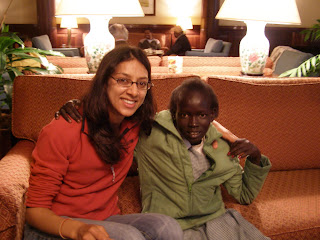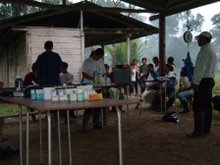
I just got back from a whirlwind trip to Chiapas to "finish up" a public health project I and three of my classmates at UCI "carried out" over the past six months in three Tzotzil communities. We were first there this past July, but for so many reasons, it was especially difficult to go back this time. We have our own collective blog.
We went to Chiapas to bring ecological stoves to 40 families in the highlands and to measure changes in pulmonary function (via spirometry) and air quality (via PM measurements) after 5 months of stove use. The project was messy in and of itself because that's how international health projects are. We went back to Chiapas to measure (hopefully) a reduction in particulate matter; however, we did not expect that open fires would be blazing all day long (worse than in the summer when we took pre-stove installment measurements) because of the cold season. Oops. We also could not have predicted vast political changes in Las Abejas, the civil society that we are partnering with to carry out the project. The social climate had changed dramatically, and it affected relationships among the health promoters, families and communities we worked with, as well as our relationship to all of them as outsiders.
Also troubling is the notion of us "executing" a "project". I hate it when people write in quotation marks as if the punctuation alone imbues your words with the hidden meaning you hope to convey. I hesitate to say we have finished our project because completing a finite project with a beginning, middle and end was never my intention. In fact, having done similar things in the past, that was exactly what I wanted to avoid. As a future public health professional (God willing), I'm looking to establish relationships and make lifelong investments in international health. I want to lay down roots. When I signed up for Chiapas, I saw that potential. Looking back on our interactions with the communities, however, I don't think we built relationships so much as we completed a study.
Why do I say that? Months ago, I would have said that we were doing a good job building the relationship with Las Abejas health promoters. We were building bridges, hanging particulate matter machines in homes, making stoves together, making people breathe into tubes over and over again...together. We went to a health promoter meeting to announce our arrival and plan, went to church to introduce ourselves to communities, dined with families, celebrated a local festival. We bathed with rainwater, used the latrine, ate twice a day, walked up and down mountains.
But we also called all the shots. We brought these mysterious machines and collected all the filters to take back to our fancy laboratory with our fancy weighing machine to run sophisticated statistical tests to come up with Significant Data to publish in a fancy journal that the health promoters and their families will never see or understand or care about, it's that irrelevant to their daily existence. If that is true, did we truly collaborate the way we set out to do? It was a big part of our project's self-image that we had community buy-in to ensure the sustainability of our project. True, it's a huge challenge to achieve true collaboration, but if we don't have that, then what do we have? Yes, we installed 40 stoves. But do they like them? Did they make a positive impact on their health? Their quality of life? Did we gain their trust in a way that makes future cooperation likely? My head is full of these questions.
Whether they use the stoves we installed or not is a fair, honest question that deserves our evaluation, and I think that we did justice to that problem by carrying out a follow-up study of past stove recipients (last year's UCI-Chiapas cohort also installed stoves in similar communities). Whether or not the stoves improve health outcomes is another fair question we have and are continuing to evaluate through our study. But whether or not we and the health promoters of Las Abejas (and the communities they represent) have invested in a truly collaborative relationship working toward the betterment of health and quality of life in the highlands of Chiapas is another question that I don't think we gave enough thought to. And in the long run, I think it's a far more important facet of our "project" than the simple delivery of 40 ecological stoves that may (or may not) improve respiratory health.
I was talking to John Rose, the founder of UCI's relationship with Las Abejas, on the way back to San Cristobal from the community one day when we thought of a way to really work on the collaborative relationship aspect of our project versus the service aspect. The service aspect is undoubtedly important, but it gets in the way of the collaboration and two-way learning, as it did in our case. When you're running around trying to get a spirometer donated to you, designing a study, writing grants and stretching money, worrying about how to pay for 40 stoves and endless other logistical details, it's hard to concentrate on the philosophy of health promotion, the rich history of indigenous rights and resistance in Chiapas, and the intricacies of binational communication as it applies to international public health projects. We need to strike a balance between service and learning.
What we came up with is an idea that may or may not end up happening: a series of workshops next summer in which students work with health promoters to design comprehensive projects addressing their top five or so community health concerns. They can learn how to define a health problem, write a grant, gather data, and present findings. We med students can learn how health promotion works and focus more on building relationships and communicating ideas. At the end of it, UCI med students will come out having had a fulfilling experience a) learning about how health promotion works in Chiapas, and b) having shared knowledge and know-how regarding how to go about convincing the people with the money to give you funding to carry out a health project. The health promoters will be invested, too, because they will pick the health problems that will be addressed in the workshops. At the end of it, they will have several of their biggest health concerns fleshed out in a language that funding organizations understand, and whether it is in collaboration with UCI or independently, they (or together, we?) will be primed and ready to present a convincing case to attract funds.
It's an exciting prospect. I only hope I can be a part of it next year, too. Because as much as I love stoves and my experience in Chiapas this year, the idea of investing further in our relationship excites me even more.
Happy holidays!


 State House Girl's High School in Nairobi
State House Girl's High School in Nairobi
 The first day in Nakuru, introducing ourselves. Mario is to my left, Panchol to my right. We held the interviews in a church at an orphanage.
The first day in Nakuru, introducing ourselves. Mario is to my left, Panchol to my right. We held the interviews in a church at an orphanage. At the Sudanese community office discussing applications today.
At the Sudanese community office discussing applications today. Agou Jon and Mayen. I really love working with them!
Agou Jon and Mayen. I really love working with them! Mom and Kwai. Indispensable!
Mom and Kwai. Indispensable! Eliza and me after an interview. She is just starting secondary school and is disabled. She was so shy, but put her arm around me for the photo. A very sweet, determined girl.
Eliza and me after an interview. She is just starting secondary school and is disabled. She was so shy, but put her arm around me for the photo. A very sweet, determined girl.



